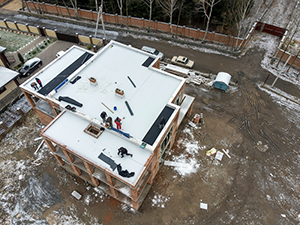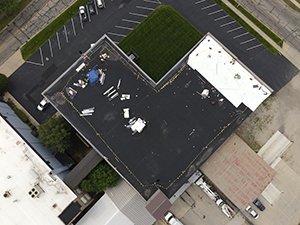
Commercial buildings represent a significant investment, and one of the most critical—and often overlooked—components is the roof. Regular maintenance of a commercial roof can help extend its lifespan, prevent costly repairs, and protect the building’s interior from water damage, mold, and structural issues. Call Glick Roofing Systems for commercial roof maintenance in North Nashville, TN on (615) 265-0598.
Why Commercial Roof Maintenance Matters
A commercial roof endures constant exposure to the elements—rain, snow, wind, UV radiation, and temperature fluctuations. Over time, this wear and tear can cause leaks, cracks, and other forms of damage. Without proper maintenance, small issues can escalate into major problems, leading to business disruptions and expensive repairs or replacements.
Preventative maintenance is key. By catching problems early, building owners and facility managers can avoid unexpected breakdowns and preserve the roof’s structural integrity. Additionally, many manufacturers’ warranties require routine maintenance as a condition of coverage, meaning neglecting it could void your warranty.
Key Elements of Commercial Roof Maintenance
Regular Inspections
Ideally, commercial roofs should be inspected at least twice a year—once in the spring and once in the fall—as well as after major storms. During inspections, professionals look for signs of damage such as blisters, cracks, punctures, loose flashing, clogged drains, and pooling water.
Debris Removal

Leaves, branches, and trash can accumulate on a flat or low-slope roof, clogging drains and causing water to pond. Standing water accelerates deterioration and can lead to leaks. Regular cleaning prevents these issues and helps maintain proper drainage.
Sealant and Flashing Checks
Seams, flashings, and joints are vulnerable points where water can infiltrate. Over time, sealants may degrade or separate, requiring resealing or replacement. Routine maintenance ensures these areas stay watertight.
Gutter and Drainage System Maintenance
Proper drainage is crucial for flat or low-slope commercial roofs. Clogged or damaged gutters and downspouts can lead to water buildup and roof deterioration. Keeping these systems clear and functional is essential for long-term roof performance.
Documentation and Record-Keeping
Keeping a maintenance log helps track roof conditions and repair history. This can be useful for warranty claims, future budgeting, and showing due diligence in building management.
Benefits of Regular Roof Maintenance
Extended Roof Lifespan: Routine care can add years to a roof’s usable life.
Cost Savings: Preventative maintenance helps avoid costly emergency repairs and major replacements.
Improved Energy Efficiency: A well-maintained roof helps regulate building temperature and reduces HVAC strain.
Warranty Protection: Regular service helps maintain compliance with manufacturer warranty requirements.
Enhanced Safety: Addressing hazards like leaks or structural weaknesses reduces risks for building occupants and maintenance workers.
Commercial Roof Maintenance Services
Investing in commercial roof maintenance is a smart and cost-effective strategy for any building owner or manager. By developing an initiative-taking maintenance plan and partnering with a trusted roofing professional, businesses can protect their assets, ensure uninterrupted operations, and maximize the value of their property. Ultimately, a little attention now can prevent a lot of headaches later. If you need commercial roof maintenance in North Nashville, TN contact Glick Roofing Systems on (615) 265-0598.
FAQ
How often should I have my commercial roof inspected?
We recommend having your roof inspected at least two times per year; once in the spring and once in the fall. You should have your roof inspected following major weather events as well.
What are the signs that will tell me my commercial roof needs repair?
Typical signs include water stains inside your building, visible damage to the roof membrane, standing water, mold, or increased energy bills connected to issues with insulation.
Can I do the roof maintenance myself?
You can remove debris on your own, but when it comes to inspections and repairs, we suggest allowing a licensed roofing professional to manage the work as it directly impacts warranty coverage and overall safety.
How long does a typical commercial roof last?
If properly maintained, a commercial roof can last anywhere from 20-40 years depending on the type of material. TPO or EPDM roofs usually last 20-30 years while metal roofs can exceed 40 years.
Does regular maintenance save money?
Yes! Regular maintenance identifies small issues before they require costly emergency repairs or premature roof replacements.

